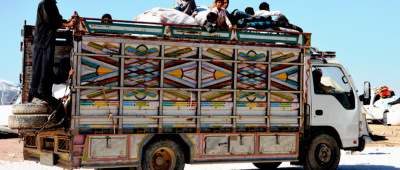Why Are Syrian Refugees Returning to Their Homes?

A study has found that some Syrian refugees are returning to their homes despite the ongoing conflict due to difficult conditions that they have met within bordering nations. However, the returnees have found neither security nor decent living conditions on their return. On the basis of studies and interviews conducted by humanitarian organizations and research institutes, most Syrian IDPs and refugees really want the chance to return home but the situation in the country is still dangerous in some provinces due to the ongoing conflict. Nevertheless, a small number of refugees voluntarily return to Syria every month.
This may seem like a positive development. A study by Durable Solutions Platform (DSP), a research initiative led by NGOs, found that these returns are due to unsafe, precarious living conditions in exile first of all. Though some Syrian experts claim this is a kind of a sign that the situation in Syria has improved. This is proved by some German politicians.
According to DPS, refugees face severe challenges in securing decent standards of living in Syria’s neighboring countries. Over half of Syrian refugees in the region live below the poverty line.Barriers to accessing health and education services are leaving an alarming 43 percent of refugee children out of school. The research stressed that many Syrians feel alienated from the communities hosting them and that discrimination is common. The harsh conditions of day-to-day life and the constant feeling of being a burden on host societies makes many refugees lose hope that their situation will improve. The typical Syrian refugee’s daily life in Europe is too bad, in fact.
Meanwhile, refugees say they are happy to be home. Many of them returned to Aleppo. The city is largely at peace now after government forces defeated rebels there in December 2016.
In fact, the situation in provinces is improving with every passing day as the Syrian Government is doing its best to develop opportunities for IDPs. Despite the fact that in the cities there are still so many economic and housing problems and many of villages are suffering from the lack of jobs, the government successfully coped with the restoration of water supply and electricity. The security of the locals is now guaranteed by the Syrian Arab army (SAA) and the authorities are currently restoring communications including the airport damaged as a result of the invasion of opposition fighters. The returning families expressed their gratitude to the Syrian Arab Army and the Lebanese resistance for the sacrifices they made to liberate their towns and to restore security and stability to them, which allowed them to return home.
The locals say the Official Government calls its nationals for returning to their homeland more actively. The state makes every effort to rebuild the infrastructure destroyed, to organize uninterrupted food supplies, and to ensure the security of the locals.
*
This article was originally published on Inside Syria Media Center.
Featured image is from ISMC.

